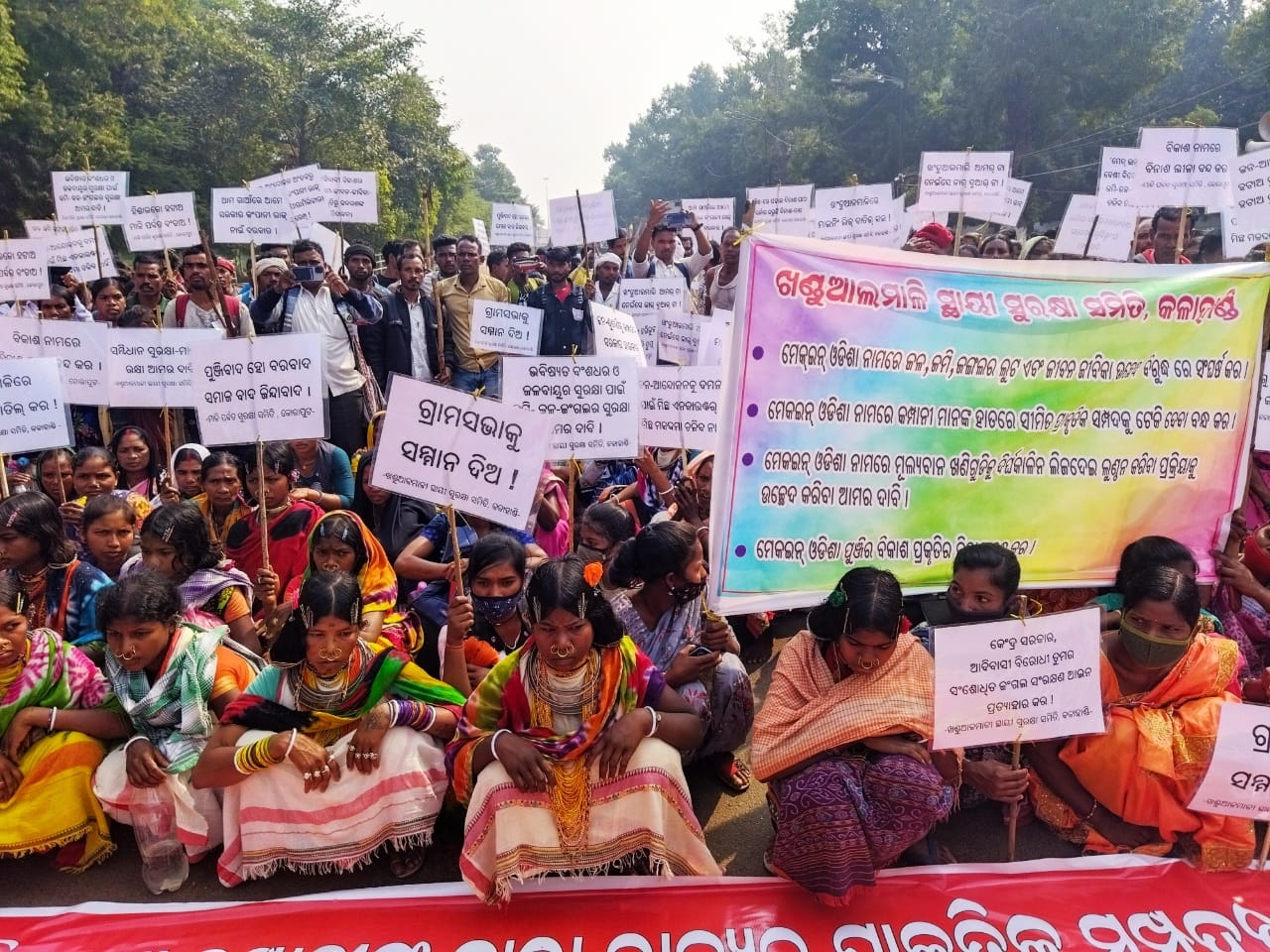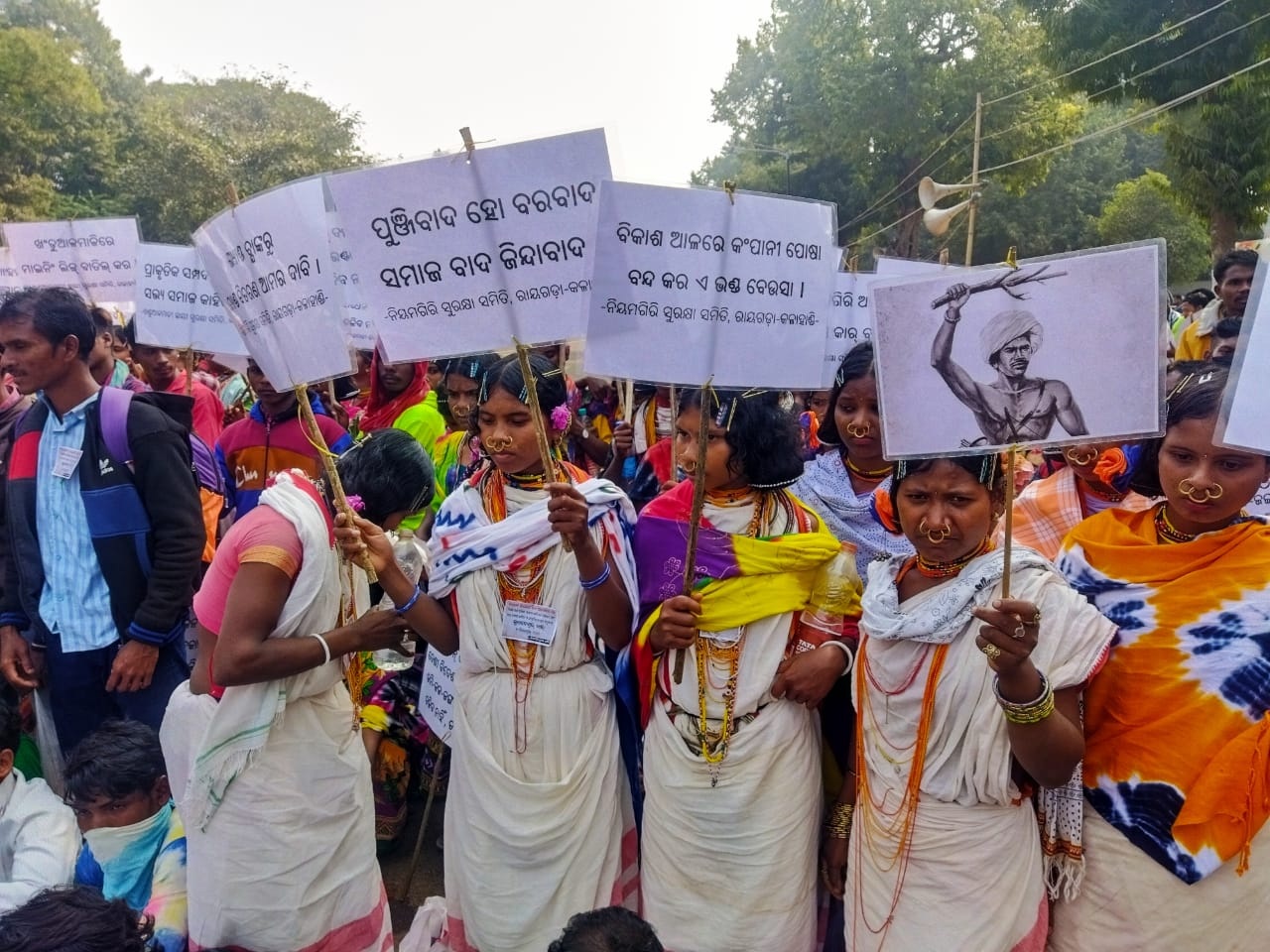The third edition of Make In Odisha Conclave 22 — an investors summit of the Government of Odisha — is going on at Bhubaneswar from November 30 to December 04, 2022. While the mainstream media is celebrating the success of the summit with the state getting investment proposals worth lakhs of crore from corporates, social, political and human rights activists, environmentalists and the leaders of various mass movements in Odisha are concerned that inviting more investments in the name of development will uproot more lives and livelihoods of people dependent on these land, forests and coasts.
Today, over 1000 protesters, including women from Dhinkia, Niyamgiri, Khandualamali and other areas of protests, gathered in Bhubaneshwar protesting against the Make-in-Odisha Conclave and the current anti-people Development Model of the Odisha government. The protesters resolved to continue all the ongoing struggles against the corporates in Odisha leading the loot of natural resources and destruction of the environment, and demanded an immediate stop to the continuous forceful displacement of people from their lands and livelihoods.
We publish the full text of an open letter issued by mass movements in Odisha on behalf of Bisthapan Birodhi Jana Andolon Mancha (Odisha) questioning the Make-in-Odisha Conclave and the current development model.
An Open Letter from People’s Movements to the Governor: Questioning the Make-in-Odisha Conclave and the Current Development Model
December 2, 2022, Bhubaneswar
Respected Sir,
We as concerned citizens, social activists, political and human rights activists, environmentalists and journalists and the leaders of twelve mass organisations on behalf of Bisthapan Birodhi Jana Andolon Mancha, Odisha, appeal for the protection of natural resources and an immediate end to the continuous forceful displacement of people from their lands and dwelling places.
We express our protest and dissent against the Odisha government’s Make-in-Odisha Conclave in Bhubaneswar. Inviting more investments in the name of development will uproot the lives and livelihoods of people dependent on these land, forests and coasts. We appeal to your conscience to intervene and prevent the exploration and exploitation of natural resources through unmindful and unwanted mining of bauxite, iron ore, chromite, coal, river sand, china clay and other resources in the name of development. People are struggling against all odds and hardships to protect the same for future generations even as they remain deprived of access to basic needs like education, health and nutritional food security.
Wherever there are mineral deposits and resources, there are green forests and mountains, which are the source of natural streams and rivers. Under the prevailing development paradigm in the interest of capital and corporates, we witness open cast mining destroying huge areas of forests, mountains with rivers and streams drying up. This ecological devastation of green vegetation, commons and agricultural lands is a direct assault on lakhs of common people, especially Adivasi and Dalits and other marginalised communities. It has adversely affected their socio-cultural-linguistic identity. Today an entire way of life is being threatened of its existence and culturally annihilated.
Mining of different ores and mineral deposits has increased exponentially since the year 2000. Huge expanses of mines and minerals have been explored and exploited legally and illegally in the districts of Keonjhor, Sundargarh, Mayurbhanj and undivided Koraput. The setting up of many extractive industries like Steel Plant, Sponge Iron Plants, Thermal Power Plants and Aluminium factories and refineries has led to thousands of people being evicted and displaced from their dwelling places, livelihood and agriculture without fair and equitable rehabilitation.
The same state and capital sponsored development paradigm that is causing large scale displacement from natural habitats is wreaking havoc on masses of people who migrate to cities like Bhubaneswar for eking out a living by joining the vast unorganised sector. Their housing rights are snatched away with impunity to build malls, corporate offices, private hospitals and apartments for the privileged classes. Large sections of industrial workers, agricultural workers, fisher people, vendors and hawkers, all working class families in short, do back breaking labour to get one square meal a day or a roof under their heads. Clearly, this kind of development is only aggravating living conditions and deepening poverty for the majority.
The process of coercive, unmindful development not only leads to dispossession and displacement but is also a gross violation of people’s fundamental rights, especially the Right to Life, and other basic freedoms. Those struggling against displacement and for the protection of natural resources and their community life, largely in Scheduled Areas, have been victims of state repression through fake encounters, fabricated cases and custodial torture, as well as faced police firing and police repression. Three young Adivasi activists of Kashipur and 13 Adivasis in Kalinganagar were killed in police firing in 2000 and 2006, respectively. Today, there are many young leaders and their village people languishing in jails while hundreds of others are under threat of arrest for daring to oppose forcible land acquisition. They are the martyrs of the prevailing development paradigm.
Needless to say, these natural resources have been protected and sustained with ecological sensitivity by Adivasi, Dalit and common peoples living in these regions. Neither the government nor the extractive polluting industries have had any role maintaining these natural resources. But instead of addressing the havoc created by mining and heavy industries, the state government is leasing out even more mines through auctions in the open market in and outside the country. No doubt this will completely exhaust the limited resources and generate new poverty zones thereby further depriving future generations from their right to inter-generational equity and justice. The eviction of Adivasi communities and thousands of other forest dwellers from their habitats into inhuman and uncertain conditions of living is a deliberate violation of the basic fundamental Right to Life and livelihood as well as flagrant disobedience of the state to the constitutional provisions and international principles on forced evictions.
As per the provisions of PESA of 1996, Forest Rights Act of 2006, Forest Conservation Act of 1986 and regulation of 1956 Act of Odisha government with new amendment in 2000, there cannot be transfer, acquisition or forceful takeover of natural resources without the consent of Gram Sabha. However, the Odisha government and its administration do not honour the said laws as they hand over mines and lands to corporate houses. In countless instances, district administration does not follow the legal process in public hearings for environment clearances or the Land Acquisition Act, 2013. Local communities across districts in Odisha have been witness to irresponsible, corrupt administrations using police force to repress peaceful, democratic people’s resistance when they voice their concerns. The hijacking of public hearings through police force in order to impose destructive projects over people’s lives is blatantly undemocratic and unconstitutional.
In 2021, without seeking consent of Gram Sabha auctions were conducted to lease out iron ore mines in pristine sal forests named Gandhalpada in Keonjhar district, five virgin forests in Sundargarh and bauxite mines in Karlapat forest, which has wildlife sanctuary in Khandualmaali in Kalahandi and Rayagada districts. Rivers of this region like Nagabali, Tel and Indravati are already adversely affected. Public hearings in Jagatsinghpur, Jajpur and Koraput districts have been openly manipulated by district administrations on behalf of companies. The demands of Adivasi villagers from Rajagangpur of Sundargarh district are overlooked as they oppose the expansion of the Dalmia Cement factory that has caused severe air, water and soil contamination.
We are faced with a widespread ecological crisis, whether it is in the mountains or in the plains. The Government of India signed the Paris Agreement to prevent climate change by reducing thermal power plants; however, the Odisha government held auctions in Angul and Jharsuguda districts to lease out coal blocks that will destroy 33000 acres of forest and agricultural land. Coastal Odisha is facing grave threats. Without paying any heed to recommendations of various expert committees, the state government is ushering in many industrial projects and in the process exterminating coastal forests, including the mangrove forest and sand dunes that are natural barriers against cyclones and storms. The proposed Shamuka Hotel project and Airport project in Sipasarubali Mouza of Puri district that aim to promote the tourist industry is depriving the local Dalit and landless communities of their rights. Instead of listening to genuine demands of local communities, the administration has foisted fabricated criminal cases. The people of Dhinkia in Jagatsinghpur district are facing continuing police repression while their betel vine plots are being destroyed. More than 25, 000 people in this region will have to live with toxic pollutants emitted by the JSW steel plant.
The Right to Life and livelihood of Adivasis in forest and mountain areas and that of subsistence peasants and farm workers depending on coastal resources and forest agriculture have to be protected. We also need to protect and conserve non-renewable natural resources for future generations. There can be no mining and industrialization at the cost of health hazards and economic and social crises. We assert people’s protection of constitutional rights which are being violated by the state to serve corporate interests. No projects or industries can be forced upon the people without their consent.
It is in this context that we emphasise that the state government inviting more investments in the Make-In-Odisha conclave goes against the interest and will of the majority of people. We will only see more destruction of pristine forests, original water sources and water bodies and coastal bio- diversities through extractive industries and coastal highways. We will see more people leaving habitats that have been home to them since generations or being compelled to live on toxic air and poisonous water.
Therefore, we humbly urge you to use your constitutional authority to prevent unmindful mining as well as ecologically devastating industries.
Our collective demands are:
- Review the policy of development based on mining and mineral extraction. Cancel all existing mining leases until the review is complete and made public.
- Take urgent steps to protect the coastal forests and sand dunes that act as a natural barrier in the cyclone-prone districts of Coastal Odisha.
- Implement the PESA Act that ensures the sovereignty of the Gram Sabha.
- Ensure proper implementation of FRA with special emphasis on the right to community forest land. Conduct with GOI the review of forests conservation rules 2022 that thwart the objectives of the FRA to facilitate corporate investment.
- Direct the state government to enforce Regulation 2 as amended in 2002 restricting transfer of lands of tribals in Scheduled Areas.
- Stop repression on mass movements whose people oppose forcible displacement and dispossession.
- Release all political prisoners from mass movements and withdraw existing criminal cases. Release Dadhi Kadraka and Daman Panga of Niyamgiri; Batakrushna Swain of Upakuliya Jami o Jangal Surakhya Samiti in Sipasurbali; and Debendra Swain and Pradeep Satapathy of the Jindal-POSCO Pratirodh Sangram Samiti, Dhinkia and all other people who have been opposing the exploitation of their land and natural resources.
- Advise the state government to invite investment for intermediary industries to use the products of industries like NALCO and other steel plants as raw materials to create value addition to final goods in a decentralised way.
- Restore unutilised land possession by companies and state governments under land bank to the original landholders and to landless farmers.
- Initiate people’s consultations for pro people development and ecological and environmental protection.
Urging your intervention with hope for the rights and dignity of the people of Odisha,
Yours sincerely,
Bisthapan Birodhi Jana Andolon Mancha (Odisha)
Niyamgiri Surakhya Samiti (Rayagada-Kalahandi)
Khandualmaali Sthayi Surakhya Samiti (Kalahandi)
Maali Parbat Surakhya Samiti (Koraput)
Kodingamaali Surakhya Manch (Lakhmipur-Kashipur)
Upakuliya Jami o Jangal Surakhya Samiti (Puri)
Jindal-POSCO Pratirodh Sangram Samiti (Dhinkia)
Basti Surakhya Manch (Odisha)
Gram Sabha Committee, Rajgangpur (Sundargarh)
Upakula Bheetamaati Surakhya Samiti (Baliapal)
Zilla Kandha Samaja Yuva Sangathan (Bolangir)
HAL Bisthapit Sangha (Sunabeda)
Khodi Maati Surakhya Sangha (Koraput)





In solidarity